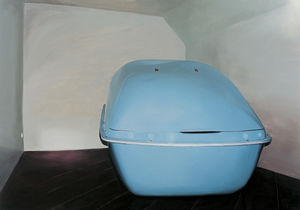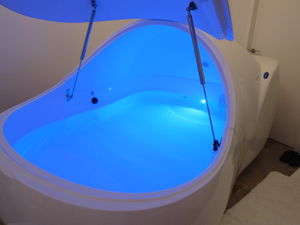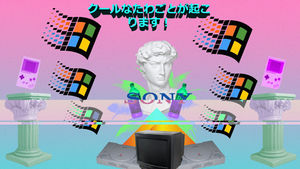User:Pleun/grad/Proposal2ndversion
~~Project Proposal
“If once we were able to view the Borges fable in which the cartographers of the Empire draw up a map so detailed that it ends up covering the territory exactly [...] this fable has now come full circle for us, and possesses nothing but the discrete charm of second-order simulacrum [...] It is the real, and not the map, whose vestiges persist here and there in the deserts that are no longer those of the Empire, but ours. The desert of the real itself.”
(Baudrillard, Simulacra and simulation)
Abstract
This yet untitled project will be an audiovisual experience which will explore the alternative therapy of the 'Sensory Deprivation Tank'[1] or 'Flotation Tank.' Not only as a Technology of the Self[2], but also to use as a window to talk about a bigger ill in society, which for now I will call by the same name as that of the 2016 documentary by Adam Curtis: 'Hypernormalisation[3].' With which I mean the tendency of our modern western society of trying to escape from instead of dealing with the complexities of this world while keeping up appearances of a fully functioning society.
“[...] however the past 40 years, politicians, financiers and technological utopians, rather than face up to the real complexities of the world, retreated. Instead they constructed a simpler version of the world, in order to hang onto power.”
(Hypernormalisation, Documentary, BBC, October 2016)
I see tendencies that express this phenomenon popping up everywhere in society. One I mentioned before: The Sensory Deprivation Tank, which was developed by a neuropsychiatrist in the fifties and later used with LSD research in the sixties, before becoming available for commercial use. The second one is the subculture of Vaporwave[4] and the third one is the growing influence of populist politics, especially the Alt-Right movement [5]. I will describe them below:
Sensory Deprivation Tank
Presentator:“I wonder if sensory deprivation could work towards deconditioning or mitigating the damage caused by all this technology?”
Frequent user: “Not just the technology. I think it can mitigate the damage of living in our society in general”
(Sensory Deprivation Tanks, Documentary, VICE, April 2013)
The act of going into a Sensory Deprivation Tank is for me one of the most extreme expressions of this behavior, where we literally hide ourselves from all stimulation by voluntarily laying inside a small and closed off space for a while. The shape represents both the beginning of life with its womb-like connotations as well as the coffin-shaped end of it. Its white, shiny and rounded exterior reminds me of how architects and designers of the nineties would describe the furniture of the future.
The strange form of commodified relaxation of floating is seen as a healing therapy, all the while similar sensory deprivation techniques are used as a system of torture within the walls of monstrosities like the prison base at Guantanamo Bay.
“When you are in the tank you are cleansing the doors of perception. When you come out you are like a baby coming out of the womb and seeing things with fresh eyes [...]”
(Sensory Deprivation Tanks, Documentary, VICE, April 2013)
The pod is reflected in a range of films like The Matrix and Alien and appears to always be used to reach a certain non-state. A sort of coma-state where the mind and body are separated to create a lapse in time, promote a healing process, keep the body from harm and/or to use the body as a source of energy.
Vaporwave
Another example is the relatively new, but already completely evolved online subculture, visual language and musical genre of Vaporwave. Born in 2010, Vaporwave began as an “ironic critique of global capitalism in the form of sample based informercials and home shopping networks” (Urban Dictionary) that used the empty promises within capitalism as a critique by heavily overusing brand aesthetic in combination with glitch and fluor, Roman statues, early nineties web nostalgia and more. The subculture later completely transformed into the subject of its own critique and was declared dead when MTV and Tumblr started to incorporate it in 2015. At the end of 2016 it is definitely not dead, it is actually more popular than ever, but it's intentions are unclear. The most interesting thing about Vaporwave is that its constantly contradicting itself. Like doublethink (a term coined by Orwell in his 1984 novel) is based at the core of the movement. The subculture is nostalgic but futuristic, criticising but loving capitalism, idealising a zoned-out state with its endless GIF-loops and elevator-music but clashing that with heavy aesthetic.
Vaporwave creates it's own hyperreality, where everything is pastel and fake. You can only see the criticism if you look beyond the flashy images and the elevator-music.
Alt Right
A third example, cause and effect of this trend of escapism is the huge rise of populist politics–especially the alt-right movement–everywhere in western society, which promotes simple solutions to extremely complex problems. Politicians who are more than ever more concerned with image and personal gain than with facts have a big influence on the way we view truth, media, news, ourselves and others. We see this reflected in the enormous amounts of mis-information which is easily spread via social media. I am mostly interested in the structure of the language used by Alt-Right politicians. Donald Trump for instance has a clear way of building his sentences; short, strongest word at the end and a lot of repetition. He also tends to use confirmation-sentences which state how obvious his points are. Such as: “Everybody knows it.”, “Believe me.”, “You know it's true.” and “Everybody tells me this.”. I want to look further into how this strategy builds trust and especially how it numbs our judgement.
Method
Within the project I will try to deconstruct systems and language used by these tendencies and re-use them to undermine them. Each example will provide certain parts of the project, who together will form a strange alternative reality, a hyperreality if you will, which will highlight and comment on current events. The Sensory Deprivation Tank is very interesting as an action and form, Vaporwave as sound and image, Alt-Right in its language. I will try to see how I can utilise each topic and see how they work or clash together.
To me the topics I mentioned are heavily linked in the way that they all numb the mind and are forms of hiding and escaping. The Sensory Deprivation Tank does quite literally that, the subculture of Vaporwave idealises (and criticises) this numb state and with its music and imagery tries to induce it from a computerscreen, the language used by populist politicians contributes to a large scale of numb escapist behavior in citizens as it promotes blind trust and post-truth.
In the next month I would like to dive into more methods of alternative criticism as well as strategies of numbing/steering perception, two examples of that are: Minor Literature and Perception Management.
Minor Literature is a term from a book by Gilles Deleuze and Felix Guattari: "Kafka: Toward a Minor Literature" published in 1986, which is about how minorities use language:
"Minor literature is not the literature of a minor language but the literature a minority makes in a major language."
(What Is a Minor Literature?, University of Southern Mississippi, 2009)
The Minor Literature Deleuze and Guattari wrote about is mainly about minorities within the political left. I am curious how nowadays the ideas of Minor Literature are of effect within the Alt-Right movement.
"The three characteristics of minor literature are the deterritorialization of language, the connection of the individual to a political immediacy, and the collective assemblage of enunciation."
(Kafka: Toward a Minor Literature, Gilles Deleuze and Felix Guattari, 1986)
Perception Management is a term from the US military which is explained by the US Department of Defence with this definition:
"Actions to convey and/or deny selected information and indicators to foreign audiences to influence their emotions, motives, and objective reasoning as well as to intelligence systems and leaders at all levels to influence official estimates, ultimately resulting in foreign behaviors and official actions favorable to the originator's objectives. In various ways, perception management combines truth projection, operations security, cover and deception, and psychological operations."
(Department of Defense Dictionary of Military and Associated Terms, 2010)
Practical Execution
The project will most likely take the form of an installation, which explores these topics I am presenting in a way they form their own meta-hyperreality.
Timeline
December - January
- Further crystallising the concept, while starting to experimentation with: sound, image, space and vibe.
- Collecting material and reflecting.
- Building a test-space for me to use.
- Talking to peers about what they feel could work to express my ideas.
February
- Pre-production: Filming and/or programming.
March
- Post-Production: Editing and correcting
- Testing with public
- Re-shooting if necessary
April - May
- Post-Production: Debugging,
- Building the installation and further testing.
Further Context
A few out of many:
- Concepts of Hyperreality and Post-Truth,
- Alt-Right–A lecture by Florian Cramer,
- Hypernormalisation–Documentary Curtis,
- Museum of Analogue Reality– theatre performance by collective Macabre,
- Internet of Things and Prometheus Unbound, two theaterplays by URLAND,
- Wait but why's blog about AI: Singularity,
Another trend is escaping into the technological utopia of for example Elon Musk, who is hoping to colonize Mars within the next 30 years, or Raymond Kurzweil who is a public advocate for the belief in and workings towards the singularity. Within the futuristic prospects of a technological utopia as a realistic future as well as in science fiction, I am interested in the way it exaggerates the now to predict the future.
Relation to previous practice
This subject is a direct continuation of the project I proposed last year, which was already about sensory deprivation, but linked to a society of control.
Endnotes
Technology of the Self
One of four "technologies" as described by Michael Foucault is the Technologie of the Self:
"[...] which permit individuals to effect by their own bodies and souls, thoughts, conduct, and way of being, so as to transform I themselves in order to attain a certain state of happiness, purity, wisdowm, perfection, or immortality."
Hypernormalisation
“The term "hypernormalisation" is taken from Alexei Yurchak's 2006 book Everything was Forever, Until it was No More: The Last Soviet Generation, about the paradoxes of life in the Soviet Unionduring the 20 years before it collapsed. A professor of anthropology at the University of California, Berkeley, he argues that everyone knew the system was failing, but as no one could imagine any alternative to the status quo, politicians and citizens were resigned to maintaining a pretence of a functioning society. Over time, this delusion became a self-fulfilling prophecy and the "fakeness" was accepted by everyone as real, an effect which Yurchak termed "hypernormalisation".”
(Hypernormalisation, Etymology, Wikipedia)






